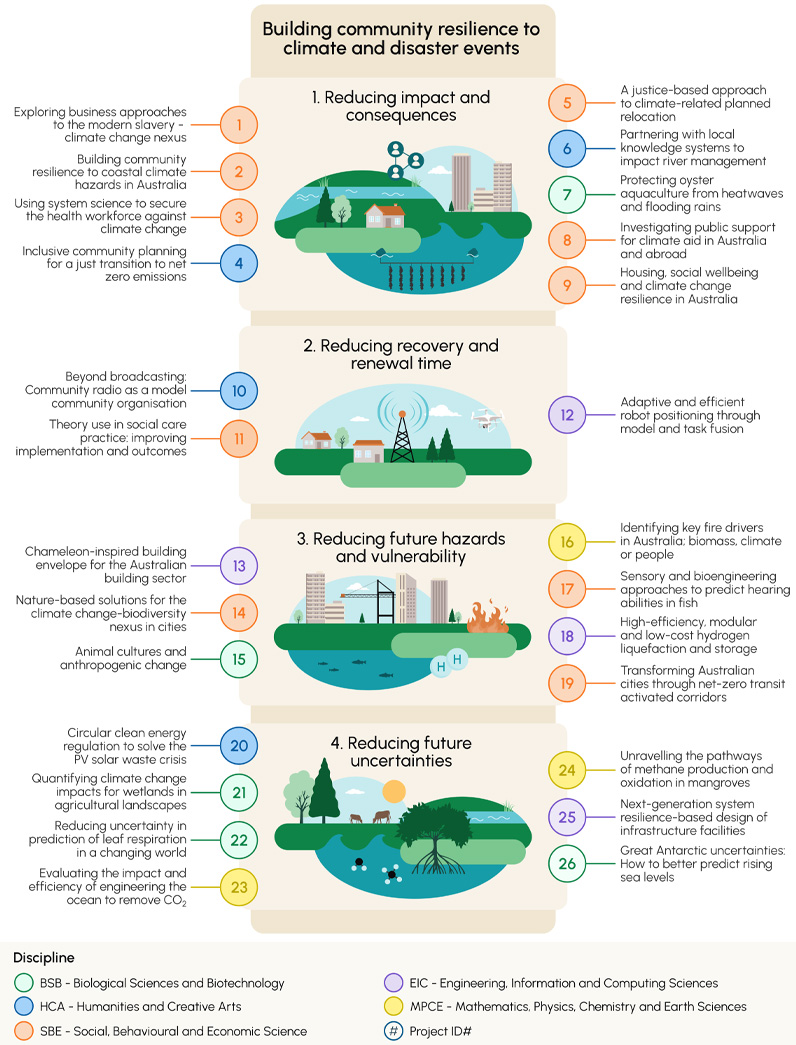Each year, the Australian Research Council funds up to 200 Discovery Early Career Research Awards (DECRA) to support excellent and innovative research that addresses a significant problem or gap in knowledge and that benefits Australia.
When the 2024 cohort came together in March 2024 for an induction event, it became clear that enhancing community resilience through multiple disciplines and approaches was a common theme across the projects. Community resilience has been defined by Koliou et al. (2020)1 and Patel et al. (2017)2. Here, we conceptualise climate and disaster community resilience as having 4 components that the collective DECRA projects contribute to (following Graveline and Germain 2022)3:
- Reducing impact and consequences: Research that will help communities, industries or systems reduce vulnerabilities and build capacity and resilience to be better prepared when disasters hit, and therefore reduce effects on people’s lives, the economy and society.
- Reducing recovery and renewal time: Research that will assist communities to respond and recover quickly and effectively. Recovery may include returning to prior or a new state (bouncing back/bouncing forward). This can include research to improve services available to populations during and after disasters.
- Reducing future hazards and vulnerability: Research that examines/draws on past events and associated learning to inform adaptation or mitigation efforts to reduce future vulnerabilities.
- Reducing future uncertainties: Research that generates new knowledge so systems can adapt/change in the absence of impact; research that supports proactive adaptation to change. This can include new climate models.
The contribution of DECRA24
From 200 DECRA fellows in the 2024 round (DECRA24), 26 reported that their research contributed to community resilience. The projects are multi-disciplinary and cover research fields of human geography, urban and regional planning, architecture, social work, civil and chemical engineering, health services, computational and evolutionary biology, ecology, oceanography, biogeochemistry and more. Koliou et al. (2020) comment on the increased scope of community resilience studies, which now include topics across a diverse range of vulnerabilities. In line with this, 14 of the 26 DECRA24 projects (54%) contribute to more than one component of resilience. While acknowledging these cross-cutting contributions, each DECRA fellow allocated their project to one of the 4 mentioned categories. The contributions of the 26 projects to community resilience are summarised in Figure 1.

Figure 1: Contributions of the 26 projects to community resilience.
A commitment to collaboration
Category 1 projects explore community resilience, health care demands during crisis, sustainable transitions and public support for socially minded adaptation policies. A justice-centred approach is common.
Category 2 projects reduce recovery and renewal time following disturbance by better understanding the strategies that support preparation and recovery. This includes improved impact assessment, communication and service provision in affected communities.
Category 3 projects develop new knowledge to inform technological improvements in infrastructure, build ecosystem resilience and address climate effects in combination with other significant social and ecological issues.
Category 4 projects reduce risk via approaches and technologies that better predict and manage greenhouse gas emissions and the effects of climate change (e.g. sea-level rise) while improving the sustainability of the new and existing technologies.
Trans-disciplinary research is critical to bring an holistic approach to the complex socio-ecological inter-relationships that shape community resilience in Australia and beyond. The 26 DECRA24 projects cover 22 disciplines and contribute new knowledge across 4 categories of community resilience. This bodes well for the development and generation of knowledge to address the various yet interconnected aspects of community resilience. The DECRA24 cohort fosters ongoing engagement throughout research projects. This collaborative approach allows new knowledge to be shared, future collaborations to be built and gaps in our understanding to be identified that can ultimately strengthen resilience in communities.


